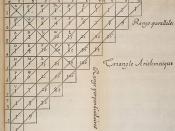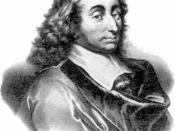- � PAGE �1� -
Phil Conte #1
Stats - 3
Historical Paper
4/1/09
Pascal's Wager
Blaise Pascal was a French mathematician, physicist, and religious philosopher. He was a child prodigy who was taught by his father, a civil servant. Before his late-life conversion to Christianity, Pascal focused most of his work on natural and applied sciences as well as mathematics. He started his work around the age of 16, when he wrote a paper on projective geometry. He would go on to made important contributions to the construction of mechanical calculators, the study of fluids, the concept of pressure in a vacuum, probability theory, social science, economics, and calculating the volume of solids. Works for which he is chiefly remembered are Pascal's Triangle: "A convenient tabular presentation for binomial coefficients" (Wikipedia), Pascal's Law: "a change in the pressure of an enclosed incompressible fluid is conveyed undiminished to every part of the fluid and to the surfaces of its container" (Wikipedia), the Pascaline: the second mechanical calculator, capable of calculating numbers out to 9,999,999, and Pascal's Wager: a logical reason to believe in God.
All of these landmarks in his life took place before his religious conversion except the Wager. In 1654, Pascal converted to Christianity, abandoned all work on science and mathmatics and began work on philosophy and theology. One of the most influencial philisophical works he wrote was the Pensées - a defense of the Christian religion. In this work, among other thing, Pascal outlines his wager or gambit.
Pascal's Wager (or Pascal's Gambit) is a suggestion posed by Pascal that even though the existence of God cannot be determined through reason, a person should "wager" as though God exists, because in doing so, one has everything to gain and nothing to loose. Aside from the theological...


